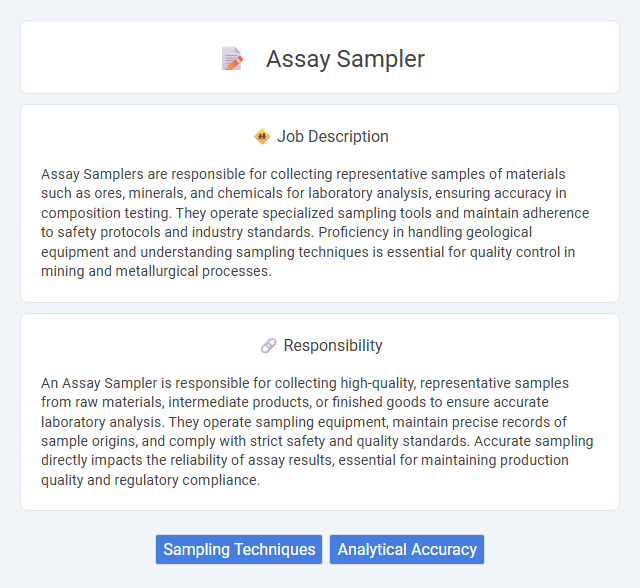
Assay Samplers are responsible for collecting representative samples of materials such as ores, minerals, and chemicals for laboratory analysis, ensuring accuracy in composition testing. They operate specialized sampling tools and maintain adherence to safety protocols and industry standards. Proficiency in handling geological equipment and understanding sampling techniques is essential for quality control in mining and metallurgical processes.
Individuals with strong attention to detail and the ability to work methodically are likely suitable for an Assay Sampler position, as the role requires precise sampling and handling of materials. Those who prefer routine tasks and can maintain concentration under repetitive conditions may find this job fits well with their skills. Conversely, candidates who struggle with meticulous procedures or lack patience might have difficulty succeeding in this role.
Qualification
An Assay Sampler requires a strong background in chemistry or metallurgical engineering, often holding a bachelor's degree or equivalent technical certification. Proficiency in handling and preparing samples for chemical analysis is essential, alongside knowledge of safety protocols and laboratory equipment operation. Experience with precise measurement techniques and adherence to quality control standards further ensures accurate assay results.
Responsibility
An Assay Sampler is responsible for collecting high-quality, representative samples from raw materials, intermediate products, or finished goods to ensure accurate laboratory analysis. They operate sampling equipment, maintain precise records of sample origins, and comply with strict safety and quality standards. Accurate sampling directly impacts the reliability of assay results, essential for maintaining production quality and regulatory compliance.
Benefit
The Assay Sampler role likely offers significant benefits in ensuring the accuracy and reliability of mineral assay results, which can lead to improved decision-making in mining operations. This position may provide opportunities for skill development in sample collection techniques and analytical methods, enhancing career growth potential. Employers probably value the precision and attention to detail required, contributing to a safer and more efficient work environment.
Challenge
The Assay Sampler role likely presents significant challenges related to precision and accuracy in collecting samples for chemical analysis. There is a strong probability that handling hazardous materials and maintaining contamination-free samples requires strict adherence to safety protocols and meticulous attention to detail. This job may also demand adaptability to varying work environments and conditions, increasing the complexity of the task.
Career Advancement
Assay Sampler professionals gain specialized skills in mineral analysis and quality control, positioning them for upward mobility into roles such as Metallurgical Analyst or Laboratory Supervisor. Experience with advanced sampling techniques and data interpretation enhances opportunities in mining project management and process optimization. Mastery of industry-standard software and safety protocols further accelerates career progression within mineral exploration and extraction sectors.
Key Terms
Sampling Techniques
Assay Samplers utilize precise sampling techniques to collect representative ore, soil, or mineral samples, ensuring accurate assay results critical for mineral exploration and quality control. Techniques often include channel sampling, grab sampling, and pit sampling, each tailored to specific geological conditions and project requirements. Proper sample handling and preservation methods are essential to maintain sample integrity and prevent contamination throughout the assay process.
Analytical Accuracy
Assay Samplers play a critical role in ensuring analytical accuracy by meticulously collecting representative samples from raw materials, intermediates, or finished products for laboratory testing. Precision in sampling techniques directly impacts the reliability of assay results, which are essential for quality control and process optimization in industries like mining, pharmaceuticals, and chemical manufacturing. Maintaining stringent sampling protocols minimizes contamination and sample bias, thereby supporting consistent analytical outcomes and regulatory compliance.
 kuljobs.com
kuljobs.com